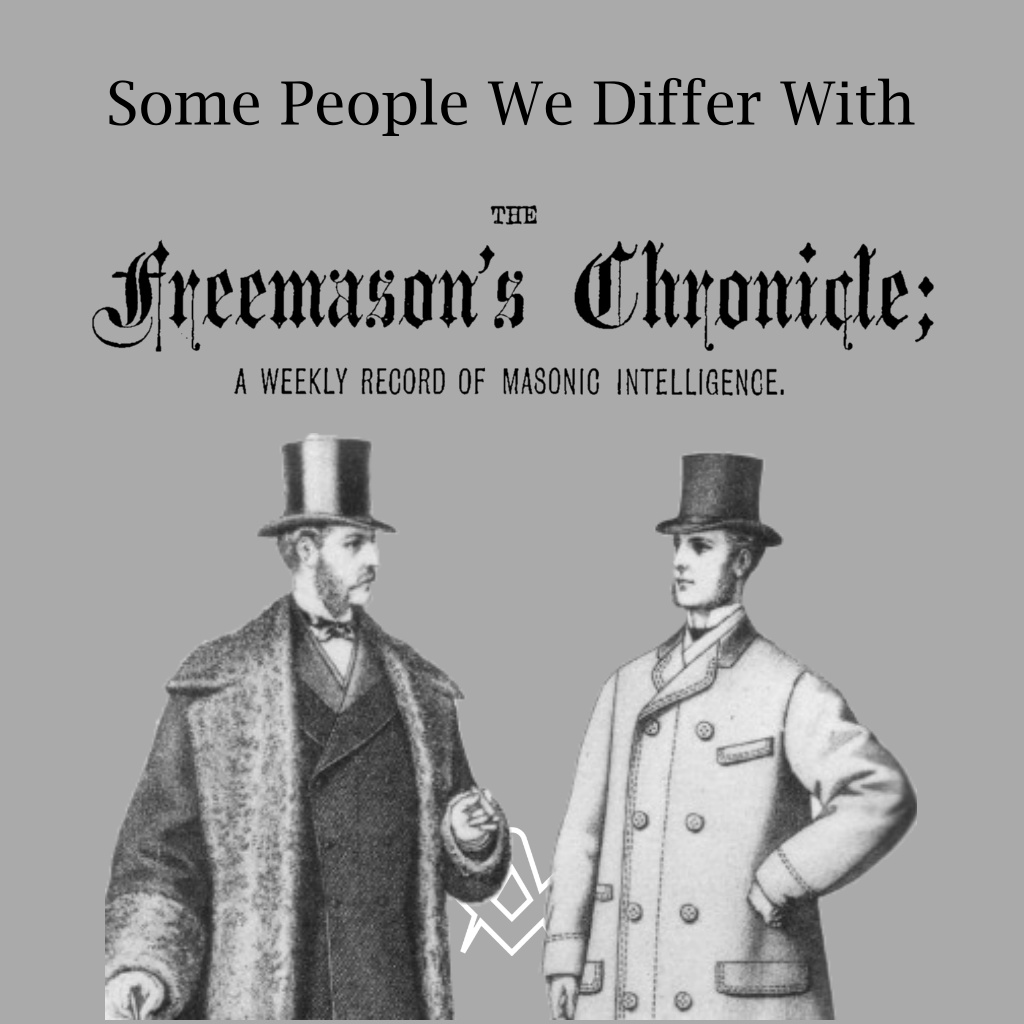It is given to few men to pass through life without occasional differences with their fellows. We are not alluding to differences of opinion. It is in the order of things that different people should hold different opinions on different subjects.
The differences we have in our mind are better described, perhaps, as quarrels, and at times are of a serious character.
It is by no means necessary we should be either cantankerous or litigious, morose, or ill-natured.
We may be among the most genial people in the world, and yet there are those who, if we will not quarrel with them, will find, some way of quarrelling with us.
Of course, Masons are bound, by the tenour of their obligation, to avoid giving and taking offence, and where two brethren are at issue, a ready means is provided for securing a reconciliation between them.
But Masons are merely mortals, and as liable, therefore, to error as the rest of mankind. The most elaborate, the most comprehensive code of laws will not prevent Masons from occasionally yielding to human weaknesses.
Thus it comes about that the relations between brethren of the mystic tie cannot always be described as fraternal.
It being, then, impossible to wholly avoid disputes with certain brethren, let us devote a little space to noting some of those whom it may be our misfortune to differ with, glancing briefly at their various points aud temperaments, so that we may at least be on our guard, against saying or doing any thing to cause them any annoyance.
So shall we be acting according to our vows, both in the letter and the spirit.
Foremost among the number of disputatious brethren, comes Bro. Cantanker. He makes a point of saying unpleasant things. It is, in fact, in his nature that he should make himself very disagreeable to all whom he comes in contact with. When he became a Mason he omitted, not unnaturally, perhaps, to leave outside the Lodge doors the very un-Masonic feature which chiefly characterised him then, as it still does now.
We have before referred to Bro. Cantanker, as one of those who object, on principle, to any aucl every proposition.
A good many people are not a little disconcerted at first on finding themselves in his company.
If they are foolish, unseeming squabbles often follow. If they are wise, they take his objections in good part, making the best they can of a very angular-minded brother.
They very soon learn that his disagreeable utterances are not intended to be offensive, and must always be taken with a qualification, ‘exceptis excipiendisis’, that is, present company always excepted.
He is at heart a very good fellow. Ho acts up to the spirit, if not to the letter, of his obligation.
He is Bro. Cantanker by name, as well as by nature, but he is not ill-natured. He gives of his substance to worthy objects. He knows well enough the uses of a chisel, but he never applies it to smooth away the roughness’s of his own nature.
Those who know him thoroughly, respect him, but they cannot be said to love him.
It is inevitable that differences should arise with such a brother, for he has a mortal antipathy to anything like agreement.
But this induces no feeling of enmity, or even of anger. We come to look upon his invariable objections as a part of the price we pay for the privilege of knowing him.
We forget and forgive but too readily the roughness and acidity of the temper, out of respect for the sterling worth of his character.
Not so with Bro. Litigant, who likewise objects on principle, but the principle which animates him in his display of cantankerousness is far less respectable.
He is not overparticular in the conduct of his relations with others. It does not follow, of course, that a litigious should also be a grasping man, but we always fancy somehow he is under the influence of mercenary motives.
He seems as though he were always on the look out to gain some advantage over us, and we are far from sure that he is scrupulous in the means he employs in order to gain his ends.
The man who wars with us on principle, though the principle involved exceeds not in value one halfpenny, may be worthy of all respect as a thoroughly honest and honourable man, yet, rightly or wrongly, we have always a presentiment, not only that he would like to triumph over us in the particular point at issue, but that he will strive to do so at all hazards, and be glad to acquire some further and unfair advantage as well.
Bro. Litigant, in our estimation, is a great nuisance, with his perverse determination to have it out with everybody.
We feel considerable satisfaction if we beat him; we are unusually nettled if we are beaten.
We may be momentarily angered by Bro. Cantanker, but we soon recover equanimity, and are ready to meet him again and again in any company and at any time.
But somehow, when we have once had a taste of Bro. Litigant’s quality, we fight shy of him afterwards.
We may not be in a position to explain the reason; we may even laugh at ourselves for being so silly, but the fact remains; there is a certain sense of dislike for him rankling in our breast ever afterwards.
Bro. Peevish we endure with as much philosophy as we can command. He is usually fretful about trifles, but he is very often a good fellow, and if he could only be brought to see it, a greater source of annoyance to himself than to others.
Of course, the battles we engage in with Bro. Pepper are very terrible, while they last; he hits out incontinently at whoever offends him.
He is not particular in his argument: he is whirled along too rapidly in his outbursts of passion, and one would not unnaturally conclude that anything like reconciliation with Bro. Pepper was utterly out of the question.
But this were an error. Bro. Pepper is choleric enough when his blood is up. but no one is more ready to withdraw anything he may have said in the moment of anger.
No one is more ready to apologize for any unintentional wrong he may have committed. No one is more ready to meet his op-ponent again on friendly terms.
While ever exercising a proper degree of self-respect, he is always ready to admit himself in the wrong, if wrong he has committed.
He will even take blame to himself, where none is due, if he see a chance of reconciliation. He acts on the spur of the moment, but he is generous, and never allows any ill feeling to exist in his mind.
Bro. Whiteblood, however, is another sort of personage. He is more placid in his bearing, and seemingly more manageable. The idea that he could ever take part in a squabble is most unlikely.
But, in spite of an apparently easy going temperament, he is a far more objectionable man to differ with than any of those we have already named.
He works on very silently, very cunningly. He assumes towards those persons he will quarrel with a geniality he is very far from feeling.
He never allows you to know whether anything you have said or done in all innocence has given offence, but he never forgets that you have offended.
Unlike Bro. Pepper, who speaks his mind freely and at once, Bro. Whiteblood cherishes in his memory every fancied slight, but out-wardly he is as much your friend as ever.
At length the time comes for him to pay off old scores, and then, in a cold and passionless manner, he sets himself dead against you.
You find that from the very day you unwittingly gave him slight offence till the day he opposes you actively, he has been silently working to your disadvantage, to over throw your plans.
Had you felt yourself aggrieved by any word or action of his, you would have told him so, after the manner of Bro. Pepper, and there would have been an end of the matter, as regards yourself.
But he has been all the time brooding over his wrongs, and planning schemes of vengeance.
Nor is he content with a fair retaliation assuming that you have really been guilty of offence, and merit retribution he does not rest till he has done all in his power to harm you.
It may be you have done him service in former times; this, in his opinion, is a strong reason why he should carry his feeling of enmity towards you as far as may be.
Very possibly, in utter ignorance of this growing hostility, you have made some false step. It is on the cards you have been guilty of some shortcoming of a trifling character.
It even becomes patent to you that you have thus acted, but you take no heed, you anticipate no disturbance of friendly relations, or, better still, you at once admit the error you have un-intentionally committed.
It never occurs to you, who have done him a service in former days, that he will descend to such depths of meanness, and, when a favourable time comes, will turn and do you all the injury he can.
This class of person, of which we have made Bro. Whiteblood the type, is a most objectionable one.
It is most unfortunate to be involved in any dispute with such as he is. He never rests till he has punished you out of all proportion to the nature of the injury you may have caused.
If you meet him afterwards, he meets you with studied politeness, but, at the same time, with studied coldness. He resolutely avoids all opportunities for explanation.
He is a stranger to passion in the ordinary sense, and hence we have named him Whiteblood.
It is only the sangninous man who plays the part of Bro. Pepper. Hence, with these whiteblooded, or, as they are more commonly called, white livered people, it is impossible to have any feeling of sympathy whatever.
Indeed, of all the people it may be our fate to differ with, we sincerely hope to be spared any contention with these.
We can stand Cantanker, we feel pity for poor Peevish, we fight and the very next moment are friends again with Pepper, Litigant we hold aloof from, but Whiteblood we regard as essentially malicious, and cut him accordingly.
 The Freemasons Chronicle, a weekly record of masonic intelligence, was first published 2nd January 1875 London, England as an independent weekly journal of masonic interest and continued for 27 years.
The Freemasons Chronicle, a weekly record of masonic intelligence, was first published 2nd January 1875 London, England as an independent weekly journal of masonic interest and continued for 27 years.
It should be the business of a journal devoted to the interests of the Order to attempt the removal of prejudices such as these, which, though they may have little perceptible influence upon the prosperity of the Fraternity, yet have the effect of preventing timid or ill-informed persons from enlisting under its banner.
It will not only attempt to keep pace with the growing literary requirements of the day, but it will seek to exhibit the Order to the non-Masonic world divested of its technical details, and clothed in the garb of Charity and Brotherly Love.
The questions of the hour, which exercise the minds of thoughtful men, will be handled freely and broadly, without any tinge of political or sectarian bias.
The memoranda of Masonic gatherings which will appear from week to week, will be full and accurate; and as free interchange of opinion is one of the best signs of life and vigour in any society, ample scope will be given for Correspondence on topics of interest to the Order.
If we may venture upon a new rendering of words which recent events have made memorable, we will say here, once and for all, that we will be keen men of business, and will spare no effort, consistent with honour, to achieve commercial success; but first, and before all things, we will prove to our brethren and the world that we are FREEMASONS.
Recent Articles: The Freemason's Chronicle
 Operative And Speculative Masonry Explore the fascinating transition from Operative to Speculative Masonry in our latest post. Discover historical insights from Augustus C. L. Arnold and Rev. Wm. P. Strickland, shedding light on Freemasonry's evolution and its enduring principles. Dive into the rich history and significant milestones that shaped modern Freemasonry. - The Freemason's Chronicle - 2 September 1876 |
 Discover the true essence of Freemasonry, an ancient order founded on the profound principles of love for God and man. It's a call to rise above mere appearances, to embody genuine virtue and benevolence, transcending societal pretense. Embrace the transformative power of simplicity, and let the authentic glories of Freemasonry inspire your path. |
 Discover the intriguing story of a man who became a Mason but openly professed his dislike for the institution. Unravel the peculiar circumstances that led him down this path and explore the unexpected consequences that followed. Dive into this thought-provoking account that challenges our notions of loyalty and reveals the complexities of human nature within the Masonic fraternity. |
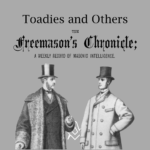 In the realm of Masonry, the principles of equality and respect are paramount. Yet, the presence of toadies—those who obsequiously seek favour from the influential—threatens these ideals. While Masonry embraces diverse beliefs and backgrounds, it rejects the sycophantic behaviours of toadies, flunkeys, and tuft-hunters, urging members to uphold genuine respect and self-worth. The Freemason's Chronicle - 22nd January 1876 |
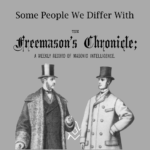 Unveiling the Unpleasant: Some People We Differ With Discover the intriguing dynamics of quarrels within the Masonic brotherhood. From the cantankerous to the litigious, the peevish to the vengeful, delve into the characters that challenge fraternal harmony. Explore their motives, temperaments, and the art of navigating disputes with these fascinating brethren. Brace yourself for a riveting journey into the world of conflicting personalities. |
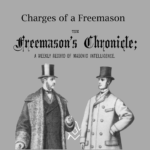 Unravelling the Masonic Mystique: A Deep Dive into the Freemasons' Charges - Explore the intricate world of Freemasonry, its principles, rituals, and the mechanisms for resolving internal disputes. Discover how this ancient fraternity fosters unity, promotes moral conduct, and upholds the sanctity of its secrets, while navigating the complexities of modern society. - The Freemason's Chronicle - 4 December 1875 |
 Unlock the hidden lessons of Masonic Studies! Don't settle for superficial knowledge or mere rituals. Discover the true depth and meaning behind Freemasonry. Expand your understanding of Tracing-Boards, Lectures, and more. Join regular Lodges of Instruction to enhance your Masonic journey. Become a knowledgeable Freemason, not just a token-bearer. Unleash the power of true Masonic wisdom today! |
 Uncover the incredible story of how Masonry saved the life of a Crimean War foot soldier in this historical and masonic account. Through the first hand experience of a soldier engaged in fierce hand-to-hand combat, witness the fateful encounter with a Russian Freemason that changed the course of his life. Learn how brotherhood and a deep dedication to the craft can lead to unforeseen and life-saving circumstances on the battlefield. |
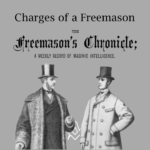 The Freemason's Chronicle - Charges of a Freemason The secrets of Masonry are the exclusive property of the Craft, and can never be communicated to one who is a mere labourer and not an accepted Mason. Hence, no labourer, that is, one who has not been regularly initiated in a legal Lodge. Article first published in The Freemason's Chronicle, 27 November 1875 |
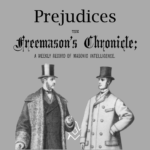 The Freemason's Chronicle - Prejudices Prejudices are partial judgments in favour of, or against certain persons or things, and, for convenience sake, may be ranged in two categories—those which are, comparatively speaking, harmless, and those which are harmful. Article first published in The Freemason's Chronicle, Oct. 2 1875. |
 The Freemason's Chronicle - Cliques Is Freemasonry - a Clique ? Man has been defined as a gregarious animal, but in his highly civilised condition he is gregarious only to a limited extent. First published in The Freemason's Chronicle, Oct. 2 1875, addresses the same challenges then as now. |
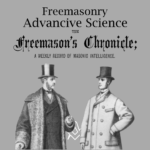 The Freemason's Chronicle - Freemasonry - an Advancive Science Is Freemasonry - an Advancive Science ? Not to confuse advancement with innovation. Has it been the case that Freemasonry's survival for 300 years plus is due to being an Advancive Science, tending to advance. First published in The Freemason's Chronicle 18 September 1875, addresses the same challenges then as now. |
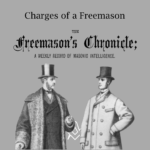 The Freemason's Chronicle - Charges Of A Freemason An interpretation of the "Charges of a Freemason", written Bro. Cornelius Moore and published in 1875, that introduce certain opinions that for some readers, will not sit well in contemporary times. - The Freemason's Chronicle, Sept. 11, 1875 |
 On The Order Of The Temple And Its Doctrine. THE Order of the Temple is divided into two great classes, denominated respectively the Order of the Temple and the Eastern Order. The Eastern Order gave birth to the Order of the Temple, and in the course of time has become an appendage of the latter. It is in ancient Egypt that we find the cradle of the Eastern Order. The Freemason's Chronicle, Sept. 4, 1875 |
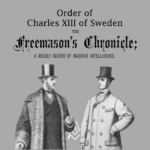 Order of Charles XIII of Sweden The following translation of the Manifesto of King JL Charles XIII of Sweden, on the occasion of his establishing the Masonic Order which bears his name, and of the Statutes of the said Order, may be interesting to our readers. The Freemason's Chronicle, Aug. 28, 1875 |
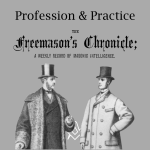 Most of our readers in the course of their experience, have doubtless met with enthusiastic brethren who take it for granted that a Mason can do no wrong. These enthusiasts are thoroughly convinced that the vast majority of those who join the Order are the most benevolent, the most moral, and the very noblest members of society. - The Freemason's Chronicle 10 July 1875 |
 An article investigating the relationship between masonry and citizenship. Are the principles of Freemasonry aligned with the freemason's claim to be a better citizen of the world? The Freemason's Chronicle - 19 June 1875 |
 A visitor must make clear his identity to the satisfaction of the Lodge he proposes to visit. More than once have we been asked to explain our views as to the reception of strangers in a Lodge. - The Freemason's Chronicle - 29 May 1875 |
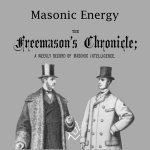 Is there reason in the accusation that Masonic energy looks only to a course of good feeds, when we can point to such grand results as have been achieved in these latter years, both in respect of the extension of our Order ? - 1May 1875 |
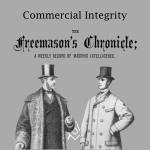 Implementing Freemasonry's peculiar system of morality in our day to day business affairs was the topic of this article, Commercial Integrity, first published in The Freemason's Chronicle - 8 May 1875 |
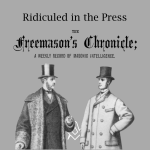 Ridicule has been somewhat illogically described as the test of truth. If it were so, Freemasonry ought to have perished long since. Two press reports from May 1875 covering the |
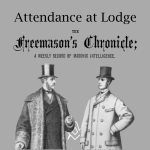 There are many things which Freemasonry will do for a man in the way of opening his mind and giving him larger and kindlier views of life, but Freemasonry itself, cannot eradicate the natural bias of the disposition. |
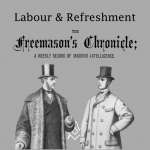 There is, we fear, too marked a tendency in very many Lodges to hasten through its labours, with a view to entering, as soon as possible, upon the business of refreshment. - The Freemason's Chronicle 17th April, 1875 |
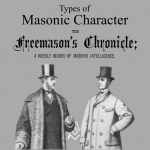 Another example that demonstrates that nothing really changes in Freemasonry. In an article the Types of Masonic Character published 145 years ago in The Freemason's Chronicle 10th April, 1875 |
 A brief history on the relationship between the British Monarchy and the craft - The Freemason's Chronicle 20th March , 1875 |
 What are the qualities of a convivial man and how does this dovetail perfectly in to Freemasonry ? 16th March, 1875 |
 A review of the "Sketch for the History of the Dionysian Artificers," a fragment, by Hyppoli to Joseph Da Costa - This little work may be regarded as, so to speak, the Holy Grail of Masonry. |
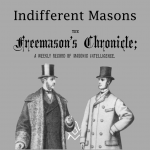 Nothing really changes, an article Indifferent Masons, From Le Monde Maçonnique 1874. Translation published in The Freemason's Chronicle 20th February, 1875 |
 In handling an intruder in the lodge, we endeavoured to show that a good Mason should be a gentleman, and a sincere man. The Freemason's Chronicle 20th February, 1875 |
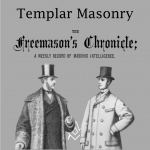 Templar Masonry - a historical aspect of the Religious and Military Order of the Temple published in The Freemason's Chronicle 13th February, 1875 |
 Secrecy perhaps the strongest objection urged by the enemies of the Masonic Order against its existence published in The Freemason's Chronicle 20th March 1875 |
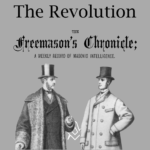 Freemasonry In The United States during And After The Revolution We take a look at Freemasonry in the United States during and after the Revolution first published in The Freemason's Chronicle - February 6, 1875 |
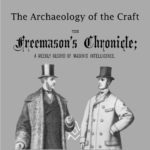 We take a look at the archaeological connection with the Craft, first published in The Freemason's Chronicle - January 30, 1875 |
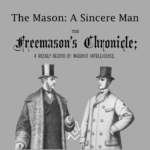 What it means to a Freemason to be a sincere man. Extract: first published in The Freemason's Chronicle - January 23, 1875 |
 What it means to a Freemason to be a citizen of the world ? First published in The Freemason's Chronicle - January 16, 1875 |
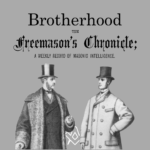 Brotherhood! In that one word what sympathetic associations arise. First published in The Freemason's Chronicle - January 9, 1875 |
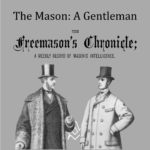 This opening article was written 145 years ago, yet it resonates with Freemasons today as it did then. First published in The Freemason's Chronicle, January 2, 1875, Issue 1 |
masonic knowledge
to be a better citizen of the world
share the square with two brothers

click image to open email app on mobile device



